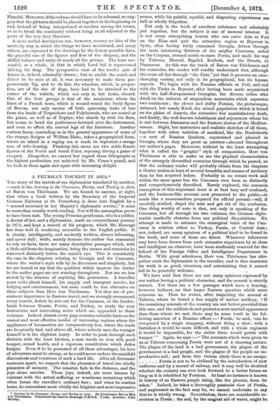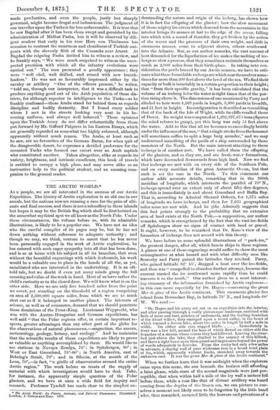A PRUSSIAN TOURIST IN ASIA.*
THE story of the travels of one diplomatist translated by another, —such is the Journey in the Caucasus, Persia, and Turkey in Asia, of Baron von Thielmann. We are bound to assume, at sight, that when a book written by the Secretary of the Imperial German Embassy at St. Petersburg is done into English by a " second secretary in her Majesty's diplomatic service," it must be more than usually worth reading. Nor will the assumption prove to have been rash. The young Prussian gentleman, who is a soldier, a doctor of law, and a diplomatist, made an extraordinary journey in 1872, and kept a record of his progress, which Mr. Heneage has done well in rendering accessible to the English public. It is clearly, intelligently, and modestly written, always informing, and never dull ; while, mainly because the author has consented to rely on facts, there are many descriptive passages which, with a little aid from the imagination, bring the scenes and countries he traversed distinctly before the mind's eye. This is remarkably the case in the chapters relating to Georgia and the Caucasus, where the writer's style tells by its directness and simplicity, but we are bound to say that the qualities which impress the reader in the earlier pages are not wanting throughout. Nor are we less struck by the absence of anything like pretension. A traveller must write about himself, his supply and transport service, his lodging and entertainment, but none could be less obtrusive on these subjects than Herr von Thielmann. Yet they are of pre- eminent importance in Eastern travel, and we strongly recommend every tourist, before he sets out for the Caucasus, or the border- lands between Russia, Persia, and Turkey, to study the very instructive and interesting notes which are appended to these volumes. Indeed, almost every page contains valuable hints on the easiest and most effective modes of traversing regions where the appliances of locomotion are comparatively few, where the roads are frequently bad, and above all, where nobody save the voyager himself is in the slightest hurry. In order to push through such districts with the least friction, a man needs an iron will, good temper, sound health, and a vigorous constitution which defies fatigue. Even if he be possessed of all these advantages, his love of adventure must be strong, or he could never endure the manifold discomforts and vexations of such a hard life. After all, fortunate moments apart, we suspect that the pleasures of travel are chiefly pleasures of memory. The miseries fade in the distance, and the joys alone survive. Those joys, indeed, are more intense by contrast with the actual suffering or wearisome monotony which often forms the traveller's ordinary fare ; and when he reaches home, he remembers most vividly the brighter and more impressive * Journey in the Caueassu. Persia, and Turkey in Asia. By Lieutenant Baron Max von TMelniann. Translated by Charles Heneage, F.R.G.S. 2 vele. London : John Murray. scenes, while his painful, squalid, and disgusting experiences are half or wholly forgotten.
Not only is the book of excellent substance and admirably put together, but the subject is one of unusual interest. It is not every enterprising tourist wbo can enter Asia at Poti on the Rion and quit the attractive region at Beyrout in Syria, after having fairly examined Georgia, driven through
the more interesting .distriets of the mighty Caucasus, sailed, on the Caspian, crossed north-western Persia, and made his way by Tabreez, Mosoul, Bagdad, Kerbela, and the Desert, to Damascus. As this was the track of Baron von Thielmann and his comrades, the reader will readily understand that, although the route all lies through "the East," yet that it presents an ever- changing variety, not only in its geographical, but its human aspects. We begin with the Russian officials at Poti, and end with the Turks in Beyrout, after having been made acquainted. with the half-Europeanised Georgian, the diverse tribes who. dwell on the isthmus of stupendous mountains which separates. two continents ; the clever and shifty Persian, the picturesque, untamed, but manly Kurd, the mixed population which is found_ on the plains of Assyria, the attractive but unsatisfactory Arab, and finally, the well-known inhabitants and sojourners whose lot. is cast between Damascus and the Eastern shores of the Mediter- ranean. Slight, but instructive and realistic sketches of all these, together with other varieties of mankind, like the Duchobortz —a sort of Russian Quakers, expatriated and planted in Georgia, where they are great as carriers—abound throughout. our author's pages. Moreover, without in the least attempting what is called the "graphic" style of composition, Herr von Thielmann is able to make us see the physical characteristics- of the strangely diversified countries through which he passed, so that the ordinary reader will probably obtain from his chapters- a clearer notion at least of several breadths and masses of territory than he has acquired before. Probably in no extant work and within the same space has the Caucasus ever been so distinctly and comprehensively described. Rarely explored, the common conception of this important tract is at beat hazy and confused, and the business-like account now presented to the public—it- reads like a memorandum prepared for official perusal—will, if carefully studied, dispel the mist and get rid of the confusion.. One thing worthy of note is that, not only in speaking of the Caucasus, but all through his two volumes, the German diplo- matist markedly abstains from any political disquisitions. No attempt is made to estimate the strategical value of the Cau- casus in relation either to Turkey, Persia, or Central Asia ;. nor, indeed, are many opinions of a political kind to be found in the book, and none of these are direct. Whatever inferences may have been drawn from such extensive experience by so close and intelligent an observer, have been studiously reserved for the behoof of the Foreign Office and Intelligence Department in Berlin. With great adroitness, Herr von Thielmann has alto- gether sunk the diplomatist in the traveller, and in that character his work is so good, vivacious, and entertaining that it cannot. fail to be generally welcome.
We have said that there are not many opinions expressed by our author having a political character, and the remark is strictly correct. Yet there are a few passages which have a bearing,. however indirect, on that larger Eastern question which more• concerns us. Thus he writes, after inspecting the arsenal at. Tabreez, where he found a fine supply of useless artillery, tqf the remaining arsenals of the country are not better provided than- this one, and the soldiers do not present a more martial appearance- than those whom we saw, there may be some truth in the fol- lowing assertion of a Russian officer Persia,' he said, 'can be conquered by a single company, without firing a shot ; with a battalion it would be more difficult, and with a whole regiment. it would be impossible, for the entire force would perish with hunger." Again, he says :—" The accounts which were given to- us at Tabreez concerning Persia were not of a cheering nature._ The plague of the land is a bad government, the plague of the government is a bad people, and the plague of the people an un- productive soil ; and from this vicious circle there is no escape-
Persia is not to be civilised by the introduction of new uniforms and by a morsel of railway, and it may well be doubted. whether the country can ever look forward to a better future so. long as it is inhabited by Persians. At least no instance is known in history of an Eastern people rising, like the phoenix, from its ashes." Indeed, he takes a thoroughly pessimist view of Persia, and unpleasant as the fact may be, we cannot undertake to say that he is wholly wrong. Nevertheless, there are considerable re- sources in Persia ; the soil, by the magical aid of water, might be made productive, and even the people, justly but sharply governed, might become frugal and industrious. The judgment of our traveller upon the Turks is far less unfavourable. It is true that he saw Bagdad after it has been clean swept and garnished by the administration of Midhat Pasha, but it will be observed by dili- gent readers that early in his tour Herr von Thielmann has occasion to contrast the smartness and cleanliness of Turkish out- posts with the slovenly filth of the Cossacks near Ararat. At Bagdad the reigning Pasha invited him to witness a review, and he frankly says, " We were much surprised to witness the unex- pected precision with which all the infantry evolutions were carried out." The men presented a goodly appearance ; they were " well clad, well drilled, and armed with new breech- loaders." He was not so favourably impressed either by the cavalry or artillery " One of the officers present," he writes, "told me, through our interpreter, that it was a difficult task to produce anything good out of the Arab population of these dis- tricts, for although superior in intelligence to the Turks—as he frankly confessed—these Arabs stand far behind them as regards discipline and bodily dexterity. But I found every soldier whom I met in the streets looking very neat in his be- coming uniform, and always well behaved." These opinions upon the Turkish Army do not differ substantially from those put forward by Mr. Gifford Palgrave in his Eastern Essays, which are generally regarded as somewhat too highly coloured, although apparently without much reason. The Arabs, at least such as he saw, are no favourites of the German Baron, for when quit of the disagreeable desert, he expresses a decided preference for the mounted Turks who formed one escort over an Arab zaptieh who constituted another. Taken altogether, alike as regards its variety, brightness, and intrinsic excellence, this book of travels is entitled to occupy a high place, and may serve alike as an instructive help to the political student, and an amusing com- panion to the general reader.







































 Previous page
Previous page